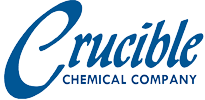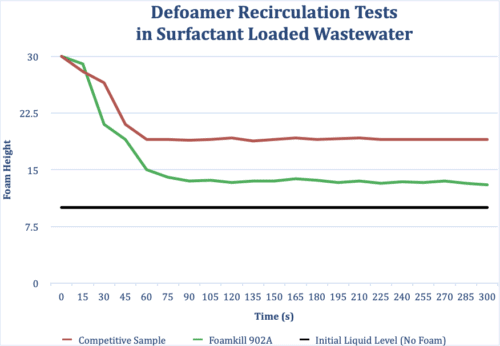Pre-processed fluids in wastewater treatment applications contain bacteria, chemicals, and compounds that pose a threat to human health. In addition, the unwanted foam formation in wastewater processing equipment can allow these compounds to build up, cause issues with the equipment, and overflow into the surrounding area.
Crucible Chemical offers a wide array of defoamers for wastewater processing. In addition to our standard product line, we also offer in-house performance and application testing. Considering the customer’s desired goals (cost reduction, regulatory requirements, performance, etc.), we run side-by-side performance tests against competitive materials using customer-provided foaming media. Often a current Foamkill defoamer is recommended along with application and dosage guidance; however, we often formulate custom products to meet the requirements of complex or unique systems.
The Challenge
For this specific project, a wastewater processor tasked us to recommend a cost-efficient offset to an antifoam emulsion used in their highly-concentrated, surfactant-loaded wastewater stream. The competitive defoamer in use was continuously metered into the system; however, it was creating deposition issues and contained mineral oil, which needed to be removed due to environmental and regulatory concerns. Additionally, the customer requested a stronger product as foam often became an issue further down the process stream.
The client provided samples of their wastewater along with the competitor’s antifoam. The challenge for Crucible Chemical was to recommend a solution that could improve upon the competitive antifoam and be mineral oil-free.
Crucible Chemical’s In-House Testing
To best simulate the customer’s process and point of application, Crucible ran benchtop recirculation tests. A recirculation test is designed to evaluate the effectiveness of foam control agents in dynamic systems to yield accurate and reproducible results of foam knockdown time and foam levels and to provide indications of persistency. Repeating these tests to ensure conasistent results, along with comparative performance testing of competitive products, allows us to recommend an effective foam control solution tailored to a specific customer process.
The Results
Crucible’s test results determined Foamkill 902A as the recommended offset to the competitive antifoam presented by the client. While the recommended Foamkill slightly lagged in initial foam knockdown, it quickly reduced foam to a lower level and maintained performance throughout the duration of the test.
While initial foam knockdown is a critical test parameter in many applications, it is less weighted in this application due to the antifoam being continuously metered into the system and the majority of foaming issues occurring further downstream than the point of addition. Foamkill 902A also does not contain any mineral oil, which as a component of the competitive sample, can promote surface spreading and dispersion, thus improving initial knockdown.
Finally, the recommended Foamkill 902A exhibited a cleaner emulsion than the competitive sample, reducing deposition concerns. Upon dilution, the competitive sample formed a visible ring on the container wall within minutes of dispersion.
The project is summarized in the table below.
| Project Overview | |
| Project name & description | Antifoam Solution for Wastewater Treatment |
| Client’s specification | The recommended product must:
|
| Industry for use | Wastewater treatment |
| Recommended products | Foamkill 902A |
| Standards met |
|
Partner With Crucible Chemical for the Best Defoamer Solutions
Crucible Chemical Company provides a wide range of foam control solutions for every application. Our innovative, custom solutions can benefit a diverse industry base, including water treatment, paint and coatings, adhesives, paper, and many others. Send us a sample of your foaming solution so we can recommend the right formula for your system requirements!
Contact us today to learn more about how our defoamers and other antifoaming agents can help your operation.

